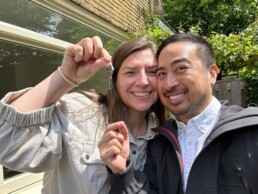Mark and Cristina’s Journey: From Expats to Dutch Locals
From Expats to Nederlanders
In the world of real estate, it's not just about buying and selling houses. It's about building relationships and watching our clients' stories unfold. Mark and Cristina are a perfect example. We've helped them find their home three times, and their journey is a wonderful story of becoming part of the Dutch community.
Mark and Cristina started their journey in 2016 with their first home, a double upstairs place in Amsterdam West. As their family grew, they needed more space. In 2019, they moved to a bigger house, still in Amsterdam West. Just last week, they found their dream family home in Amstelveen.
We've seen Mark and Cristina grow, not just in their homes but in their lives too. They now have two beautiful children. We’re so proud they chose us to help them each step of the way.
The Changing Role of Expats
An "expat" is a person who lives outside their home country, often for work, usually planning to go back someday. But in the Netherlands, many expats have decided to stay. They build their lives here, make friends, and their kids grow up with Dutch kids in local schools. Some even become Dutch citizens, loving the relaxed lifestyle and good work-life balance.
The expat community is now a big part of Dutch society. Many expats feel so at home here that calling them expats doesn’t fit anymore. They are Nederlanders, fully part of the Dutch culture and economy.
Celebrating Mark and Cristina’s Story
Mark and Cristina’s story shows this change. From expats to being part of the local community, their journey is one of growth and new beginnings. Stories like theirs show that living in the Netherlands makes it special – a place where people from around the world can find a home and become part of the community.
As real estate agents, we love being part of these stories. We’re excited to help more families like Mark and Cristina find their perfect home and become part of the Dutch way of life. Contact us via info@burgemeestervastgoed.nl or fill in the contact form and we will get back to you ASAP!
Navigating Expectations in Amsterdam's Property Market
Navigating Property Purchases in the Netherlands
Purchasing a property in the Netherlands requires careful preparation and awareness of potential pitfalls. Fortunately, a skilled real estate agent can help you navigate this complex market.
What Does 'Managing Expectations' Mean?
In Amsterdam's unique property market, determining the right property for you and understanding what is attainable can be challenging. A knowledgeable real estate agent will guide you through the properties that match your personal, financial, and holistic needs.
Remember, while buying a property is an exciting milestone, it’s crucial to stay realistic. Disappointments can occur, so do not get too attached to any property before securing it.
Understanding the Bidding Process
Bidding is how you express interest in purchasing a house, akin to a proposal. This process requires careful management, especially with 'closed bids,' where multiple parties are interested. A closed bid can create uncertainty, as the seller may choose from various offers.
Property Values vs. Online Listings
The initial prices listed online often differ from the final purchase price. Given that buying a home is one of the biggest investments you'll make, it's vital to be realistic about what you can afford. In the Netherlands, actual purchase prices can significantly exceed the listed prices. Your real estate agent will help you understand how property valuations affect your buying process.
Making Changes Within the Canal Ring
If you're considering buying within Amsterdam's canal ring, be aware that it has been a protected area under UNESCO's World Heritage List since 2010. This designation imposes restrictions on property alterations. Most changes require an integrated environmental permit, and some alterations might not be allowed at all. Barry can guide you through these regulations to ensure a smooth buying process.
Finding a Good Real Estate Agent
Barry Burgemeester, a native of Utrecht, has over 23 years of real estate experience in Amsterdam. His extensive knowledge of the local market is invaluable, especially for expat clients. Barry can anticipate potential issues and concerns, providing expert guidance in this unfamiliar territory. Contact Barry at info@burgemeestervastgoed.nl to get started today!
From Bid Disappointments to Home Search Success
At Burgemeester Vastgoed, we empathize with the whirlwind of emotions that homebuyers go through, particularly when dealing with the letdown of missing out on a dream home bid. It might seem like the perfect house is always just out of reach, but don’t lose hope!
Buying a home is a major milestone, so it’s crucial to take care of yourself and avoid feeling overwhelmed during the process. To help you maintain your balance, we’ve put together five tips that could make a difference.
Acknowledge your feelings
Feeling disappointed and frustrated after losing out on a bid for a home is okay. Allow yourself to acknowledge these emotions without judgment. Ignoring or suppressing your feelings can prolong the healing process.
Stay realistic
In this housing market, there might be someone with bigger pockets than yours. Understand that there are limitations to what you can afford and prioritize financial prudence. Take the advice from your real estate agent seriously and avoid stretching beyond your means.
Focus on what you can control
Although you’ve missed out on a particular home, there’s still much you can influence. Take proactive steps by reassessing your goals, finances, and housing preferences. One exciting avenue to explore is venturing into different neighbourhoods, maybe even going further than your desired location.
Practice self-compassion
Be kind to yourself during this time. Remind yourself that not winning a bid does not diminish your worth or abilities. Treat yourself with the same empathy and understanding that you would offer to a friend facing a similar situation. Engage in self-care activities that help you relax and recharge.
Maintain perspective
Even when you give it your all, external factors like better offers can sway the outcome. Remember, not winning a bid doesn’t mean you fell short. Stay focused on what you can influence, practice self-compassion, and keep searching for your dream home. This approach helps you cope with regrets and stress, ensuring you move forward positively.
We believe there’s a perfect home out there for everyone. Sometimes it may take a bit longer to find, but staying resilient is key, especially when you have the support of the right estate agent.
Feel free to send an email via info@burgemeestervastgoed.nl to discuss your adventures and see how we can work together.
A Complete Guide to Real Estate ABC: Essential Dutch Terms
When buying a home in The Netherlands, the real estate market involves grasping these Dutch terms. A clear understanding of these words will empower you to make well-informed decisions. At our company, we aim to provide you with the best information possible and to be transparent every step of the way. That's why we've created this Guide to Real Estate ABC—to help demystify the process and ensure you have the knowledge you need to make confident choices.
We've also produced numerous videos on home buying and interesting blogs.
Here's Your A-Z Guide:
- Afsluitprovisie (Closing Commission) When buying a home this means the closing commission. This fee, tied to mortgage closure, should be factored into your overall budget.
- Akte van Levering (Deed of Transfer) A vital document in Dutch real estate, transferring ownership from seller to buyer.
- Akte van Splitsing (Deed of Division) In apartment living, "akte van splitsing" details property division, defining ownership and shared responsibilities within a building.
- Anti-speculatiebeding (Anti-Speculation Clause) An important clause in property contracts that restricts the buyer from selling or transferring ownership for a specific period, discouraging speculative practices.
- Appartementsrecht (Apartment Right) It signifies the right of ownership and use of a specific part of a building, maintaining the unit's integrity without the authority to divide it
- Bankgarantie (Bank Guarantee) This serves as security, assuring the seller that the buyer has the financial means. The bank guarantees the seller up to a certain amount, deposited in a third-party account at the notary's office.
- Beschermd Stadsgezicht (Protected City View) This term refers to a designated area or landscape within a city that is legally protected from development or alteration to preserve its visual appeal or cultural significance.
- Blokverwarming (Block Heating) It's a central heating system serving multiple units in the same block.
- Bodemrapport (Soil Report) A document detailing soil composition and suitability for construction.
- Bouwkeuring (Building Inspection) This assesses the property's structural integrity, revealing potential issues that influence the property's value.
- Courtage (Commission) The commission paid to real estate agents. Understanding this term ensures transparency in your agreement, clarifying the financial aspects of their assistance.
- Eigendomsoverdracht (Transfer of Ownership) This is when legal delivery or transport of property occurs on a pre-agreed date.
- Energie Label (Energy Label) An energy label is a certification indicating the energy efficiency of a building or appliance.
- Executiewaarde (Foreclosure Value) In case of financial struggles, foreclosure may lead to a forced public sale of property by the bank at a value often lower than the market price.
- Hypotheek (Mortgage) This grants a lender rights to a borrower's property, often referred to as the loan itself.
- Hypotheekakte (Mortgage Deed) A notary-drafted document that pledges the property as collateral to the lender, outlining rights and obligations.
- Informatieplicht (Disclosure) Property owners are legally obliged to reveal information, such as structural conditions, that could influence a sale.
- Kadaster (Land Registry Office) This is where ownership rights of land and property are publicly recorded.
- Koopovereenkomst (Sale and Purchase Agreement) A binding contract obligates a transaction between a buyer and seller.
- Koopsom (Purchase Price) The agreed-upon amount by the buyer and seller is stated in the purchase deed.
- Kosten Koper (Buyer's Costs) As a buyer, you are obliged to pay costs such as transfer tax, cadastral rights, and notary fees.
- Lijst van Zaken (List of Moveables) It's an inventory of portable items like furniture and appliances that can be easily moved from one place to another.
- Maisonette A house with living and sleeping areas on separate floors.
- Makelaar (Real Estate Agent) Mediates property transactions exclusively for clients, serving their interests. An agent is a negotiator, not a trader. Since 2001 anyone can call themselves a real estate agent.
- Meetrapport (Measurements Report) A document detailing the dimensions and specifications of a property or structure.
- Nota van Afrekening (Settlement Statement) A bill of settlement, drawn up by a notary. It details transaction costs like transfer tax and brokerage fees, costs for registration, closing costs of any mortgage loan and the estate agent fee.
- Notaris (Notary) The notary is a public official appointed by the King and will take care of the transfer of ownership of a house and mortgage. He or she is responsible for registering the deed of transfer at the Land Registry and registering the mortgage in the mortgage register.
- Ontbindende Voorwaarden Agreement becomes void if certain conditions aren't met.
- Overbruggingskrediet (Bridge Loan) Uses equity from an old home to bridge the gap between buying a new one.
- Passeren (Passing) Formal signing of property documents at the notary's office.
- Service Kosten (Building Fees) Covers common expenses in apartment buildings, like insurance and maintenance.
- Souterrain A cellar partly above street level.
- Taxatie (Valuation) Assesses property value by a (sworn) appraiser.
- Transport Akte (Deed of Transfer) Records property ownership change, registered with the land registry.
- Vereniging van Eigenaren (Owners' Association) Represents homeowners' interests in shared buildings.
- Vrij op Naam (VON) Legally required costs are included in the purchase price, excluding mortgage costs.
- WOZ (Wet Waardeering Onroerende Zaken) This law brought uniformity in the valuation of immovable properties and is the value of the house if it were to be sold empty to the highest bidder or the free market value
- Wet ter voorkoming van Witwassen en Financieren van Terrorisme (WWFT) The WWFT, or "Law for the Prevention of Money Laundering and Financing of Terrorism," mandates that parties like Real Estate Agents, Financial Institutions, and Notaries verify client identities, conduct due diligence, report unusual transactions, and maintain records. This is to combat money laundering and terrorist financing by detecting and preventing illicit activities in the financial system. As part of this, they may ask for proof of identity and income from clients.
At Burgemeester Vastgoed, we're on a mission to make everything as clear as possible. If you want to know more or add a term to the list, feel free to reach out via info@burgemeestervastgoed.nl or visit our website's contact page.
Happy house hunting!
Home Buying: Explore the Process in this 5-Minute Video
Whether an apartment or a house, buying a new home in Amsterdam can be a challenge for expats. This video guides you through the house-buying process – and helps you understand each step involved in buying the home of your dreams.
We are always here to help, and no question is too challenging. Feel free to ask anything, and we’ll do our best to assist you.
Property defects: understanding your rights
As an experienced and certified purchase estate agent in #amsterdam , I've helped many expats find their dream homes. In my opinion, buying a new home should be a joyful and stress free occasion. However, what if you encounter defects in your recently purchased property? Let's dive into it.
Under Dutch housing law, the purchase and sale of a residential home require a written agreement called the purchase- and sales agreement. This agreement covers essential aspects like price, conditions, finance clauses, and property information. It can be a standard NVM agreement, an so called Amsterdam's Model like we use in Amsterdam, or a custom agreement, as long as it complies with Dutch law.
The language used in the purchase and sales agreement is vital for protecting your rights. That's why it's crucial to have guidance from someone like me who understands the importance of clearly stating essential information.
When buying an existing home with previous occupants, the moment of ownership transfer is key to addressing any defects. As the owner, you take responsibility for the property. Older properties may have natural wear and tear that isn't anyone's fault. For example, you might encounter leakage or a sagging floor after a few months.
The purchase and sales contract often states that the previous owner can't be held responsible for such age-related issues. If you face significant issues that impede your use of the property, legal action may be an option, but it's important to understand your rights and obligations first.
Seller's obligation: Disclosure
The seller is legally obligated to disclose important information about the property, including its condition and the surrounding environment. Failure to disclose hidden defects or issues that impact the property's residential use may be a breach of contract. Examples include hidden asbestos or unsafe wiring. Sellers must provide this information to avoid accountability for resulting issues.
Buyer's obligation: Examination
Buyers are responsible for conducting a reasonable examination of the property. This determines what they could have reasonably known based on legal standards. If a defect is clearly visible or discoverable during examination, it becomes challenging to argue it as a breach of contract. The extent of investigation required depends on the property's age.
When can the contract be breached?
To determine if a defect qualifies as a breach of contract, consider three factors:
- what is specified in the purchase and sales agreement
- whether the defect is essential to the deal
- what is considered reasonable under Dutch Law
A defect must significantly impact your ability to use the property or have played a crucial role in your decision to purchase.
If you encounter problems after you became the owner, contact your purchase agent for assistance. If you bought the property without an agent, consult a real estate lawyer for guidance. It's a good idea to try negotiating to resolve property defect disputes.
Different rules apply when purchasing newly built houses!
Getting a professional structural inspection and report is often a wise investment if you need to hold the seller accountable later on for major defects. Sometimes this is not needed, if we have recent knowleadge and recent data on the property.
Are you in the process of searching for a home to buy?
To navigate this competitive market, it's advisable to work with a certified and experienced real estate agent like myself. I'll examine the agreement, inspect the property for visable defects myself, and address financing or architectural concerns if necessary. I understand that the information provided in this article may be overwhelming. Feel free to reach out to me for a chat. We can discuss the possibilities of working together and explore how I can assist you in your home buying journey.
Why Skimping on a Real Estate Agent Could Cost You Your Dream Home
Amsterdam's fickle property market is something of an enigma. It's not always easy to know where to start, whether that be finding the best people to work with, the location you'd like to live in, or knowing whether or not the home you have your eye on is worth the money.
It's true what they say - it's better to aim for quality the first time.
We all know that if you buy something cheap, it's likely to be poor quality and it'll break, wear out or not be fit for purpose. As a result, you'll need to buy a replacement, costing you more money in the long run. Well, the same applies to the housing market!

Why work with a real estate agent?
A certified and experienced real estate agent will help you to navigate prospective homes, and costs and advise you on the necessary steps so you can feel confident in the knowledge that you are making informed decisions when in unfamiliar territory. Despite the pandemic, the market in The Netherlands is hot right now; but making sure you have the right team behind you is essential. If you choose to team up with someone who's not particularly experienced within the Amsterdam real estate market, chances are you'll be selling yourself short - and nobody wants to be stuck with a home they want to get rid of!
Manage your expectations
In our article about managing expectations, we delve into the fact that the prices you see first day do not always align with the actual purchase price. Buying a home is the biggest investment most people will make in their lifetime. Unless you have unlimited funding, you need to be realistic about what it is you can afford because chances are, the price will be higher than what was advertised.
How does one calculate what's affordable?
If you are unsure about what you can afford, a mortgage advisor or bank can help you weigh up your income and expenditure to determine the most cost-effective solutions for you when it comes to purchasing your property. In the Netherlands, the purchase price can vary greatly from what you originally saw online. Your real estate agent will guide you through the effects that the valuation process will have on the property you are interested in.
Okay - so where do I start?!
From there, we can draw up a list of appropriate options to suit your needs. That being said, there is no point in purchasing a home that doesn't live up to the value of the property, so do proceed with caution and consult your real estate agent beforehand to do any background research.

Why work with a real estate agent?
Barry Burgemeester is a Dutch native. Originally hailing from Utrecht, he has worked for over 23 years in real estate in Amsterdam and his extensive knowledge of the area is uncontested.
Barry's background and expertise are invaluable to our expat clients, mainly because his wealth of experience within the Dutch market guarantees that he will be able to predict any potential issues or concerns you may have when introduced to this unfamiliar territory. Get in touch at info@burgemeestervastgoed.nl today!














